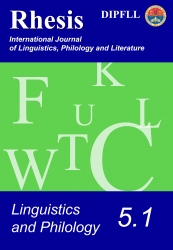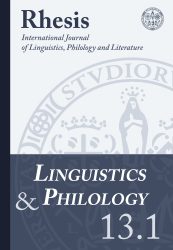 Linguistics and Philology
Linguistics and PhilologyVol. 5.1 - 2014
Download issue
Table of contents
| p. 5 | Notule sur le pronom de première personne du singulier io chez Dante AlighieriFranck FloricicAbstract The aim of this paper is to discuss the status of the two pronominal variants i’ and io found in Old Italian and more specifically in the writings of Dante Alighieri. If at first glance these variants seem to be interchangeable, a deeper analysis of their syntactic distribution shows that their functional fields only partially overlap: the apocopated variant i’ can be shown to occur in a subset of the contexts in which the full form io is available. If however the bisyllabic pronom io can be said to be heavier and stronger than the reduced variant, it does not follow that the latter is a clitic: even though i’ is in some sense engaged in the path of cliticization, its syntactic distribution clearly shows that in Old Italian it does not have clitic status.
|
| p. 22 | Per uno studio della lingua della poesia orale campidanese: aspetti fonetici di un corpus di gare poetiche Daniela MereuAbstract In this paper I present a phonetic analysis of a corpus made up of ten cantadas, sung improvised poetic competitions widespread in the South of Sardinia and performed, generally, by four improvisers (cantadoris). This article aims to show that, on a phonetic level, oral poets, coming from the different areas of Campidano, use a common variety of Campidanese in their oral poetic productions, based on the urban high register of Cagliari. The first part of this analysis showed that all oral poets eject phonetic peculiarities of their Campidanese variety and use a literary variety in their performances. Then, I have ascertained if any phonetic trait of the low register of Cagliari variety appear in the corpus. Data showed that typical features of low register of Cagliari are not used by cantadoris. The last part of the research examined particular phonetic features of the language used in the cantadas. In particular, the presence of a lot of hypercorrections has great importance: the forms that I individuated are proof of the tendency of poets to want to use the literary variety, based on the high dialect of Cagliari.
|
| p. 56 | Agli albori della libera stampa in Sardegna: note sulla lingua della “Gazzetta popolare”Anna Mura PorcuAbstract The study analyses the language of the “Gazzetta popolare” (1850-1868), the most important periodical of the mid nineteenth century in Sardinia. The syntax and lexicon of the periodical, which freely deals with social and economic questions, contain a number of innovative elements, although the journal’s language (especially spelling and morphology) generally favour traditional forms of writing. Conciseness and essentiality mark the syntactical forms; moreover, new uses of verbs (for example, conditional mood or imperfect tense) are often found in the text, similar to modern journalistic language. The analysis of the lexicon shows many important neologisms and foreign words from the political lexical field that was developing in that period in its modern form.
|
| p. 79 | Un “sociolinguista” cinquecentesco: Girolamo Olives e i suoi Commentaria et Glosa in Cartam de Logu (1567)Giulia MurgiaAbstract The present paper explores the Commentaria et Glosa in Cartam de Logu (1567), the first juridical commentary, written in Latin, of the Carta de Logu, a collection of norms published in the 14th century by the judge-kings of the Sardinian Giudicato (kingdom) of Arborea. The author of the Commentaria, the Sardinian jurist Girolamo Olives, from Sassari, was the first Sardinian magistrate to be appointed as fiscal lawyer in the Council of Aragona in 1554. In his work, Olives gives us important (socio)linguistic data for a better understanding of the Sardinian linguistic community in the 16th century. It is in this period that, beside Sardinian, Catalan achieves the highest status in the linguistic repertoire, while Castilian only slowly starts to expand. Olives takes into account some patterns of Sardinian multilingualism and provides rhetorical examples of the judge-kings’ complicated strategy of legitimation and power consolidation through biblical narrative models.
|
| p. 113 | Racist Discourse on social networks: a discourse analysis of Facebook posts in ItalyPaolo OrrùAbstract The paper addresses the way people elaborate and share resentment against immigrants on social networks. Since its beginning in 2008, the financial crisis established itself as the main topic in Italian media discourse, monopolizing almost the whole public debate. Although anti-immigrant discourse is not a novelty in the European public sphere, the long recession in Italy has strengthened this kind of feeling. At the same time social networks, especially Facebook, grew in popularity and importance, establishing itself
as a powerful means of sharing information, objectives and opinions.
The corpus of our analysis is composed by status updates and images posted on four Facebook public pages related to anti-establishment or generic protest topics. Moreover, this kind of material easily circulates on other more general groups and pages and is frequently shared by ordinary users on their personal profiles.
The analysis explores some of the main issues in racist discourse (illegal arrivals, crime, social struggle and denial of racism). In our study we take into account lexical items, rhetorical forms (metaphors, hyperbole) and arguments employed to set immigrants as antagonists of ordinary Italian people. Our aim, therefore, is to understand how new media help to strengthen racist discourse in everyday interaction.
|
| p. 134 | British stereotypes in two humorous collections of postcards: A stylistic examinationDaniela Francesca VirdisAbstract The How To Be British Collections (two booklets each composed of 32 comic postcards and equally comic comments) humorously portray the British showing their supposed national features. A representative sample from the booklets is scrutinised in this article by applying social psychological research on stereotypes with a stylistic approach. The main research purpose is to prove that the British stereotypes in the postcards are normally depicted as positive and those about foreigners and language learners as negative. Hence, the research hypothesis is that British culture and identity are extolled in the booklets, and that the non-British are represented as somehow deficient and flawed, in other words, as the actual grotesque characters in the postcards. Linguistic investigation indeed discloses that the British ethnic, social and cultural superiority over foreigners is implicitly celebrated in the booklets, along with their British protagonists and the appealing national characteristics typifying them. With regard to language learners, they allegedly lack politeness, heritage and the other positive aspects identified by social psychological studies; therefore, they are depicted as involved in ludicrous activities, a representation characterising them as hopelessly foolish and as mentally and even physically faulty.
|
Tags: allomorphy, Anna Mura Porcu, Campidanese poetic competitions, cantadoris, clitic, Commentaria et Glosa in Cartam de Logu, Daniela Francesca Virdis, Daniela Mereu, dialect of Cagliari, discourse analysis, Facebook, Franck Floricic, Girolamo Olives, Giulia Murgia, journalism, language, lexicon, literary koine, national-ethnic stereotypes, Old Italian, Paolo Orrù, person, phonetics, pronouns, racist discourse, self-stereotypes, social networks, social psychology, sociolinguistics, stylistics, The How To Be British Collections, web discourse
 Linguistics and PhilologyVol. 5.1 - 2014
Linguistics and PhilologyVol. 5.1 - 2014
